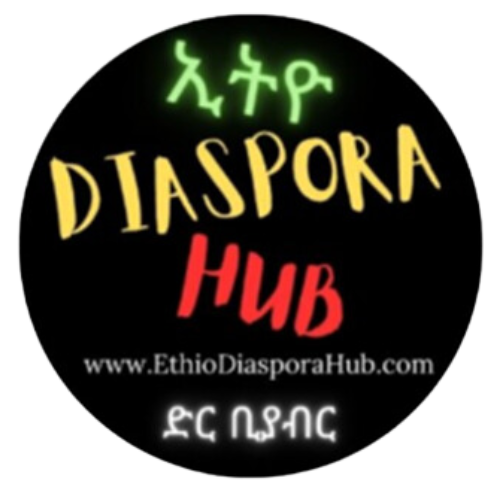Address system of Israel
- Address system of Israel
- Recipient Name
- Street Address
- City or locality
- Postal Code
- Country
- Address Example
Israel Address system
Writing an accurate address is of paramount importance in Israel due to its significance in ensuring efficient and timely delivery of mail and packages. Israel, a country known for its intricate urban landscapes and diverse population, relies heavily on accurate addresses to facilitate the smooth functioning of its postal and delivery services. Given the complexity of street layouts, house numbering systems, and the presence of multiple languages, a precise address minimizes the risk of confusion and misdelivery. The addressing system in Israel follows a formal format that includes:
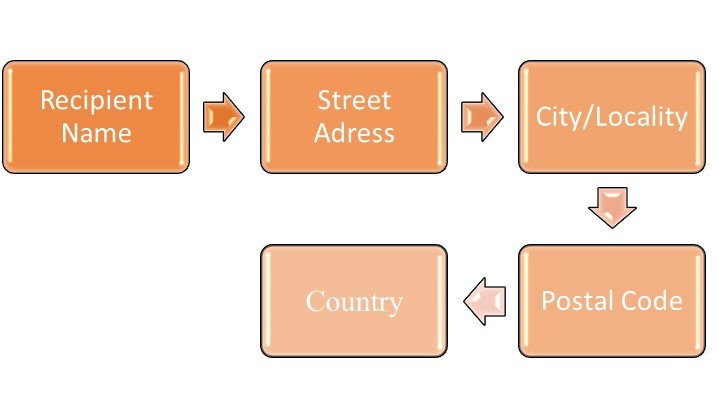
Recipient’s Name: When writing an address in Israel, it’s essential to include the recipient’s name at the beginning of the address. The recipient’s name provides a personalized touch to the communication and ensures that the intended recipient is clearly identified. Including their full name and any applicable honorifics or titles, such as Mr., Mrs., Dr., or Prof., reflects cultural norms of respect and formality. This approach acknowledges the individual’s identity and distinguishes them within the context of the communication. Moreover, a correctly written recipient’s name helps postal and delivery services accurately route the correspondence or package, contributing to the overall efficiency and effectiveness of the delivery process.
Street Address: A street address in Israel is a crucial component of an accurate mailing address. It specifies the precise location where mail or packages are to be delivered. It typically consists of the street name and house or building number. In cases of apartment buildings, the apartment or unit number is included as well. This level of detail is particularly important in Israel’s urban areas with intricate street layouts and diverse building arrangements. A well-written street address ensures that postal and delivery services can easily locate and deliver items to the intended recipient, facilitating efficient communication and timely receipt of goods. It is recommended to follow the local conventions while formatting the street address to minimize the risk of confusion or misdelivery.
City or Locality: The term “city or locality” in the context of addressing an envelope or package in Israel refers to the specific urban area or geographical region where the recipient is located. This element of the address indicates the primary administrative division where the recipient’s address is situated. In urban settings, this is often the name of a city or town. In rural areas, it might refer to a smaller locality or village. Including the accurate city or locality name is crucial for efficient mail delivery, as it helps postal and courier services navigate to the correct destination. Additionally, the postal code associated with the city or locality aids in further pinpointing the exact delivery point, enhancing the precision of the address.
Postal Code: A postal code, also known as a ZIP code or postcode in different regions, is a numerical code used in addresses to help pinpoint the specific geographic area where the recipient is located. In Israel, the postal code is a critical component of the address, contributing significantly to accurate and efficient mail and package delivery. Each postal code corresponds to a specific region, street, or even a smaller area, enabling postal services and couriers to navigate the complex urban and rural landscapes of the country more precisely. By incorporating the postal code in the address, senders ensure that their correspondence reaches the intended destination without unnecessary delays or confusion, highlighting the importance of this detail in the broader context of communication and logistical operations.
country: While addressing mail within Israel, you typically don’t need to mention “Israel” as the country since it’s assumed. However, if you’re sending mail from abroad, it’s a good practice to include “Israel” at the bottom of the address.
Language: When writing addresses in Israel, the choice of language plays a significant role in ensuring effective communication and accurate delivery. While Hebrew is the official language of the country and is commonly used for domestic correspondence, English is widely understood and utilized, particularly in formal and international communications. This dual-language proficiency reflects Israel’s diverse population and its interconnectedness with the global community. Whether writing in Hebrew or English, providing a clear and precise address with the recipient’s name, street, apartment or unit number, city in capital letters, and correct postal code remains essential. This attention to language and address detail ensures that mail and packages can navigate Israel’s intricate urban landscapes and diverse localities without confusion or delay.
Here’s a template for a formal address in Israel:
- Recipient’s Full Name
- Title/Honorific, if applicable
- Street Address – Apartment/Unit Number
- City in Capital Letters
- Postal Code
- Country, if sending from abroad
For Instance:
- Mr. David Levy
- 25 Rothschild Boulevard – Apartment 8
- Tel Aviv
- 5432109
- Israel
Immigration Status and Benefits in Israel
- Israel Immigration Status
- Jewish Immigration under the Law of Return
- Family Reunification
- Humanitarian and Asylum Seekers
- Special Arrangements for Non-Jewish Communities
- Work and Study Visas Leading to Residency
- Investors and Entrepreneurs
Immigration Benefits
- Absorption Assistance
- Financial Support
- Healthcare
- Education
- Employment
- Housing Assistance
- Customs and Duties Exemptions
- Veteran Immigrant Status
- Cultural and Social Support
- Citizenship and Voting Rights
Immigration status
The immigration status of new immigrants holds immense significance in Israel, reflecting the nation’s historical roots as a homeland for the Jewish people and its commitment to providing a sanctuary for Jews around the world. Israel’s Law of Return, enacted in 1950, grants Jews the right to immigrate to Israel and gain immediate citizenship upon arrival. This policy not only fulfills a deep-seated Zionist aspiration to gather Jewish communities from across the globe but also plays a pivotal role in shaping the country’s demographic, cultural, and social landscape.
The immigration status of new arrivals dictates their access to various rights and benefits, including social services, employment opportunities, and educational facilities. It also influences their integration into Israeli society, as immigrants’ legal status can impact their sense of belonging and participation in the nation’s civic life. Therefore, the immigration status of new immigrants in Israel serves as a key determinant in their journey to becoming active contributors to the country’s growth, diversity, and unity.
There are various types of immigration statuses available to individuals in Israel. Let’s explain a few of them:
Jewish Immigration under the Law of Return: The Law of Return is a fundamental legislation in Israel that grants Jews the right to immigrate and gain automatic citizenship. This encompasses Jews from diverse backgrounds, whether they are religious, secular, or belong to various Jewish denominations. This category reflects Israel’s historical mission to provide a safe haven for Jews and promote Jewish unity.
Family Reunification: Israeli citizens or permanent residents can sponsor their non-Israeli spouses, children, and sometimes other family members for immigration. Family reunification aims to preserve family ties and facilitate the integration of non-citizen family members into Israeli society.
https://www.gov.il/en/service/confirm_status_for_foreigner_family_member_in_israel
Humanitarian and Asylum Seekers: Israel also provides refuge to individuals seeking asylum due to persecution or violence in their home countries. While the number of asylum seekers in Israel is relatively small compared to other countries, this category highlights the nation’s commitment to international humanitarian principles.
Special Arrangements for Non-Jewish Communities: Israel has arrangements to facilitate the immigration of certain non-Jewish communities with historical ties to the Jewish people, such as the Bnei Menashe from India and the Falash Mura from Ethiopia.
https://lawoffice.org.il/en/israeli-citizenship-for-non-jews/
Work and Study Visas Leading to Residency: Individuals who come to Israel for work, study, or research purposes might later transition to long-term residency status or citizenship. Israel encourages skilled professionals, researchers, and students to contribute to its innovation-driven economy and academic landscape.
Investors and Entrepreneurs: Israel has also introduced visa pathways for foreign investors and entrepreneurs who wish to establish businesses and contribute to the country’s economy. These pathways are aimed at fostering economic growth and innovation.
https://ak-immigration.co.il/entrepreneurs/
These various immigration types highlight Israel’s complex approach to immigration, encompassing both its foundational commitment to Jewish unity and its acknowledgment of broader humanitarian and economic considerations. The country’s policies aim to strike a balance between its identity as a Jewish state and its responsibilities as a member of the international community.
Immigration Benefits
Immigrants in Israel, often referred to as “olim,” are eligible for a range of benefits aimed at facilitating their integration, supporting their well-being, and promoting their contributions to Israeli society. Some of the benefits for immigrants in Israel include:
Absorption Assistance: New immigrants receive various forms of support to help them adapt to their new lives in Israel. This includes language courses, cultural orientation, and integration programs that assist with understanding Israeli society, customs, and institutions.
Financial Support: Many new immigrants are eligible for financial assistance, including grants, loans, and stipends to help cover initial living expenses, housing costs, and other essential needs. This assistance helps ease the transition to a new country.
Healthcare: Immigrants are entitled to the Israeli healthcare system, which provides comprehensive medical coverage and access to hospitals, clinics, and medical services. This ensures that immigrants have their healthcare needs taken care of from the moment they arrive.
Education: Immigrant children have access to the Israeli education system, including public schools. Special programs and resources are often available to help immigrant children integrate into the education system and overcome language and cultural barriers.
Employment Services: Immigrants are provided with assistance in finding suitable employment opportunities. Job placement services, vocational training, and career guidance are often offered to help immigrants enter the Israeli job market successfully.
Housing Assistance: Immigrants may receive housing assistance in the form of reduced rent or housing subsidies, helping them secure stable housing as they settle into their new lives.
Customs and Duties Exemptions: Immigrants are granted certain exemptions from customs and import duties on personal belongings and items they bring into the country, making it more affordable for them to set up their households.
Veteran Immigrant Status: After a certain period of residency, immigrants can become eligible for additional benefits and privileges, such as reduced taxes and discounted services, similar to those enjoyed by long-term citizens.
Cultural and Social Support: Immigrants often have access to cultural events, community centers, and social networks that are tailored to their needs. These resources help them connect with others who share similar experiences and backgrounds.
Citizenship and Voting Rights: New immigrants who meet certain criteria can become citizens of Israel, granting them full rights and responsibilities as Israeli citizens, including the right to vote in elections.
It’s important to note that the availability and extent of these benefits can vary based on factors such as the immigrant’s status, country of origin, and individual circumstances. Israel places a strong emphasis on supporting immigrants as they integrate into society, recognizing the valuable contributions they make to the nation’s cultural diversity, economy, and overall development.
Your Essential Documents
- Your Essential Documents
- Israeli Identification Card (Teudat Zehut)
- Israeli Passport
- Visa
- Residence Permit
- Driving License
- Health Insurance
- Bank Account
Your Essential Documents
Understanding and possessing the necessary immigration documents is of paramount importance for new immigrants to Israel. These documents serve as the foundation for legal status, access to vital services, and integration into Israeli society. Immigrants must be well-versed in the intricacies of documents like residency permits, visas, and identification cards. These documents validate their presence in the country and facilitate interactions with government institutions, healthcare providers, employers, and educational establishments. Whether it’s the Israeli Identification Card (Teudat Zehut) that establishes their identity within the nation, the Residency Permit (Teudat Ma’avar) that grants them legal residence, or work permits that enable them to contribute to the workforce, each document carries specific significance.
While living in Israel, there are several essential documents that you will need to have to ensure your legal status, access to services, and overall well-being. These documents may vary depending on your specific circumstances and the duration of your stay. Here are some essential documents you might need:
Israeli Identification Card (Teudat Zehut): The Israeli Identification Card, commonly known as the “Teudat Zehut,” holds immense importance as an essential document for individuals living in Israel. This card serves as a primary form of identification, verifying a person’s legal status and presence within the country.
It contains critical personal information such as name, photograph, identification number, and biographical details. The Teudat Zehut is required for a wide range of transactions and interactions in daily life, including opening a bank account, accessing healthcare services, enrolling in schools or universities, obtaining government benefits, and even participating in elections.
https://www.nbn.org.il/life-in-israel/government-services/teudat-zehut-israeli-identification/
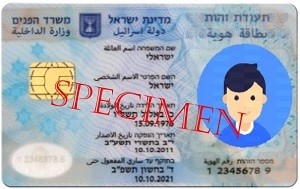
Israeli Passport: The Israeli Passport stands as an essential document of immense significance for individuals residing in Israel. Beyond its role as a travel document, it symbolizes citizenship, identity, and belonging within the nation. This compact booklet grants Israeli citizens the privilege of international mobility and serves as a tangible representation of their ties to Israel.
It acts as a testament to their legal status, offering them protection and assistance from Israeli diplomatic missions abroad. Moreover, the passport serves as a vital form of identification for various transactions and interactions, both domestically and internationally. It embodies a sense of national pride and fosters a connection to Israel’s history, culture, and community. Thus, possessing an Israeli Passport isn’t solely about crossing borders; it’s about embracing one’s citizenship, affirming one’s place within the country, and participating fully in the local and global aspects of life.
https://www.gov.il/en/service/application_for_biometric_passport2
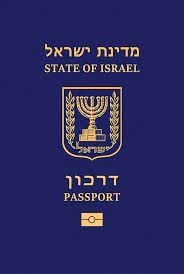
Visa: A valid visa stands as a cornerstone among the essential documents required for living in Israel, embodying a pivotal role in ensuring legal status, access to resources, and a smooth integration into Israeli society. For non-citizens, a valid visa signifies official authorization to reside within the country’s borders and engage in specific activities, whether it’s work, study, or tourism.
This document not only reflects compliance with immigration regulations but also safeguards individuals from potential legal issues or deportation. A valid visa is often a prerequisite for opening doors to essential services, including healthcare, education, and employment, anchoring one’s ability to thrive within the Israeli context. Furthermore, a visa’s expiry date holds a direct influence on one’s lawful presence, emphasizing the need for timely renewal or transition to another suitable visa category.
https://www.gov.il/en/service/request_for_tourist_visa_b2

Residency permit: The residency permit holds immense significance as an essential document for individuals living in Israel. This permit, also known as the “Teudat Ma’avar,” serves as official proof of one’s legal right to reside in the country. It not only validates an individual’s presence but also grants them access to crucial services and benefits that contribute to their quality of life. With a valid residency permit, individuals can establish bank accounts, enroll in healthcare programs provided by the National Health Insurance Law, secure employment and contribute to the workforce, and enroll their children in schools. Additionally, the residency permit is often required for renting accommodations, opening utility accounts, and engaging in various administrative processes.
It is a cornerstone of integration into Israeli society, enabling newcomers to fully participate in the nation’s economic, social, and cultural fabric. The residency permit not only safeguards the legal status of individuals but also empowers them to engage meaningfully and contribute to their new community, making it an indispensable document for a fulfilling life in Israel.
https://www.gov.il/en/service/request_temporary_residency_for_law_of_return_elgibles

Driving License: The possession of a driving license holds significant importance as an essential document for individuals living in Israel. This document not only signifies the legal authority to operate a vehicle but also enhances mobility and independence in a country where transportation is often vital. Israel’s diverse landscapes and urban environments necessitate efficient transportation, and a driver’s license enables residents to navigate these areas conveniently.
Moreover, having a local driving license is often required for certain job opportunities that involve commuting or require the use of vehicles. Additionally, it contributes to the overall integration and engagement in daily life, allowing individuals to explore the country and access areas that might be less accessible by public transport. Whether for work-related travel, running errands, or enjoying leisure activities, a driving license provides a level of convenience and autonomy that can significantly improve the quality of life for residents in Israel.
https://www.gov.il/en/services?subject=automotive_and_transportation&subsubject=driving_license
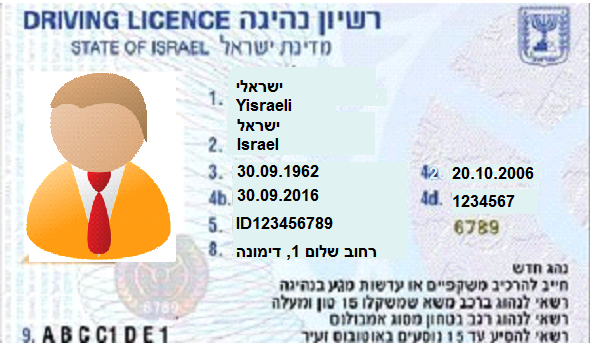
Health insurance: Health insurance holds a central role among the essential documents while living in Israel. The National Health Insurance Law mandates that all Israeli citizens and residents have access to comprehensive healthcare coverage. Possessing valid health insurance, provided through one of the country’s health funds (Kupot Holim), ensures that individuals can receive necessary medical care without financial burdens. This coverage encompasses a wide range of services, from preventive care to specialized treatments and medications. Health insurance cards facilitate seamless access to clinics, hospitals, and healthcare professionals, enabling prompt medical attention.
In a country where quality healthcare is a cornerstone of societal well-being, having health insurance not only safeguards personal health but also contributes to the overall health infrastructure. It ensures that individuals, regardless of their background or economic status, have equal access to medical services, promoting a healthier population and a more equitable society.
https://www.nbn.org.il/life-in-israel/healthcare-in-israel/overview-of-israeli-healthcare-system/
Bank Account: Having a bank account is an essential document of paramount importance while living in Israel. Beyond being a mere financial tool, a local bank account plays a central role in facilitating various aspects of daily life and integration. It serves as a hub for managing finances, enabling the receipt of salaries, payments, and transactions. Additionally, having a bank account is often required for setting up utilities, paying bills, and renting accommodations.
Importantly, it simplifies interactions with government agencies, as many benefits and services are directly linked to bank accounts. From receiving social assistance to paying taxes, a local bank account streamlines bureaucratic processes. Moreover, it offers a secure way to store funds and make purchases, fostering economic stability and contributing to an individual’s financial well-being. In a broader sense, possessing a bank account reflects one’s integration into the local economy and society, underscoring the significance of this document in ensuring a smooth and productive life in Israel.

Remember that the specific documents you need can vary based on your nationality, visa status, and individual circumstances. It’s advisable to consult with the Israeli Ministry of Interior, the Ministry of Foreign Affairs, or relevant legal authorities to get accurate and up-to-date information tailored to your situation
Understanding your finance
- Understanding your finance
- Employment Type
- Pay Check
- Funds Transfer method
- Payroll Taxes
- Tax Returns
- Banking Cards
Understanding finance is crucial for immigrants in any country, and this importance is particularly pronounced for immigrants in Israel. As newcomers adapt to a new cultural, social, and economic environment, having a strong grasp of financial concepts and practices becomes a fundamental tool for successful integration and stability. Immigrants need to navigate a complex landscape of expenses, including housing, education, healthcare, and daily living costs. A solid understanding of financial literacy empowers immigrants to make informed decisions, manage their resources efficiently, and plan for their future with confidence.
In the case of immigrants in Israel, this understanding takes on added significance due to the country’s unique challenges. Israel is known for its high cost of living, especially in major cities like Tel Aviv and Jerusalem. Immigrants need to be aware of the local economic conditions, job market dynamics, and tax regulations to make sound financial choices. Moreover, Israel’s diverse population and mix of cultures bring about varying financial practices and systems. By learning about Israeli banking, investment opportunities, and retirement plans, immigrants can maximize their financial well-being and work towards their goals.
Furthermore, financial literacy empowers immigrants to build bridges between their cultural financial practices and those of their new home. It facilitates smoother interactions with local financial institutions, aids in establishing credit history, and promotes economic participation. Immigrants who understand how to budget, save, invest, and manage debt can better contribute to their family’s and communities’ growth and resilience, fostering a sense of belonging and stability. Overall, a strong foundation in financial understanding equips immigrants in Israel to overcome challenges, seize opportunities, and build a prosperous future while becoming integral parts of the country’s socioeconomic fabric.
Employment type: Israel offers a diverse range of employment types, reflecting its dynamic economy and multicultural society. These employment options cater to various skill sets, preferences, and levels of expertise. Full-time employment remains a common choice, providing stability, benefits, and a regular income. Part-time positions offer flexibility for those seeking work-life balance or pursuing other commitments. Temporary and contract jobs are prevalent, allowing employers to meet fluctuating demands while granting employees shorter-term engagements.
Self-employment and entrepreneurship are encouraged, particularly in Israel’s thriving tech sector, enabling individuals to innovate and create their businesses. Additionally, freelancing and gig work have gained popularity, especially in creative industries. For those interested in social impact, nonprofit and NGO roles offer opportunities to contribute to meaningful causes. Israel’s diverse employment landscape allows individuals to choose paths that align with their skills, aspirations, and personal circumstances, fostering a vibrant and dynamic workforce.
https://lawoffice.org.il/en/foreign-workers-wages-in-israel/
Paycheck: A paycheck is a fundamental aspect of managing your finances as a new immigrant in Israel. It represents the monetary compensation you receive from your employer for the work you’ve done. Understanding the components of your paycheck is crucial for effective financial management.
Gross Income: This is the total amount you earn before any deductions are taken out. It includes your basic salary and any additional earnings such as bonuses or overtime pay.
Net Income: This is the amount you take home after all deductions have been subtracted from your gross income. Deductions can include taxes (income tax and social security), health insurance contributions, and pension contributions.
Taxes: Israel has an income tax system that is progressive, meaning the percentage of your income that you pay in taxes increases as your income increases. It’s important to be aware of your tax bracket and how much will be deducted from your paycheck.
Social Security Contributions: These contributions go towards Israel’s social welfare programs, including healthcare, unemployment benefits, and pensions. Understanding these deductions helps you access these services.
Health Insurance: Israel has a mandatory health insurance system. A portion of your paycheck goes towards funding the National Health Insurance plan, which provides essential medical coverage.
Pension Contributions: Planning for your future is important. Some of your earnings might be directed towards a pension fund, ensuring you have financial security in your retirement years.
Other Deductions: Depending on your situation, there might be other deductions, such as contributions to employee funds or union fees. It’s essential to know what these deductions are and why they’re being taken from your paycheck.
Frequency: Paychecks are typically issued every month in Israel, although the frequency can vary depending on your employment contract.
Payment Method: Paychecks can be directly deposited into your bank account. Ensure you have a local bank account set up to receive your payments.
Understanding your paycheck empowers you to budget effectively, plan for expenses, and save for your future. It’s advisable to keep track of your income and deductions, so you can monitor changes over time and ensure the accuracy of your payments. If you’re unsure about any aspect of your paycheck, seeking advice from colleagues, financial advisors, or online resources can provide clarity and help you make informed financial decisions.
https://www.skuad.io/global-payroll/israel
Funds Transfer methods: As a new immigrant in Israel seeking to understand financial practices, it’s important to familiarize yourself with various methods of making payments and handling deposits. Israel’s financial system offers several options to manage your money effectively. One common method is through traditional bank accounts, which allow you to deposit funds, make payments, and manage transactions.
Additionally, many Israelis use mobile banking apps, enabling convenient and secure management of finances through smartphones. Prepaid cards and digital wallets are also popular, offering ease of use and control over spending. When it comes to deposits, renting a home might require a security deposit, usually equivalent to one- or two-month’s rent. It’s essential to ensure that deposit terms are clearly stated in agreements. For larger investments like purchasing property, understanding the down payment requirements and mortgage options is crucial.
By taking the time to explore and understand these various payment and deposit methods, you can effectively navigate the Israeli financial landscape and make informed decisions about managing your finances as a new immigrant.
https://moneytransfercomparison.com/transfer-money-to-from-israel/
Payroll taxes: Payroll taxes, a crucial aspect of understanding finance for Israeli new immigrants, are the taxes deducted from an individual’s salary to fund various government programs and services. In Israel, these taxes include income tax, social security contributions, and health insurance payments. Income tax is progressive, meaning that higher earners pay a higher percentage of their income in taxes. Social Security contributions fund pensions, unemployment benefits, and other social programs.
Health insurance payments contribute to the country’s comprehensive healthcare system. As a new immigrant, it’s important to familiarize yourself with these deductions to accurately anticipate your net income. Israel offers certain tax benefits and exemptions to new immigrants during their first few years in the country, which can significantly impact your financial situation.
Seeking guidance from professionals, such as tax advisors or government agencies, can help you navigate these complexities and ensure that you’re meeting your tax obligations while maximizing the benefits available to you.
https://www.activpayroll.com/global-insights/israel
Tax Returns: For Israeli new immigrants, understanding the process of filing taxes and seeking tax returns is a crucial aspect of managing their finances. Israel operates on a progressive tax system, where higher incomes are taxed at greater rates. Immigrants should be aware of their tax obligations and deadlines, ensuring they report all sources of income accurately.
Tax returns can be filed online through the Israeli Tax Authority’s website, and it’s advisable to keep thorough records of income and expenses throughout the year. As a new immigrant, one might be eligible for certain tax benefits, such as a tax exemption period on foreign income during the first few years of residency.
Additionally, deductions can be claimed for specific expenses like education and mortgage interest. Seeking professional advice from a tax consultant or accountant experienced in Israeli tax laws can provide valuable insights into optimizing tax returns while ensuring compliance. By navigating the tax system adeptly, new immigrants can make the most of available benefits, manage their financial obligations, and secure their financial well-being in their new home.
https://www.gov.il/en/departments/israel_tax_authority/govil-landing-page
Bank Cards: Bank cards are essential financial tools for Israeli new immigrants, facilitating various transactions and offering convenience in managing their finances. These cards come in different forms, such as debit cards and credit cards, each serving specific purposes.
Debit Cards: Debit cards are directly linked to an individual’s bank account. They allow immigrants to access their funds and make purchases with ease. When used for transactions, the money is deducted directly from the associated account. Debit cards are useful for everyday expenses like groceries, bills, and other necessities, helping immigrants manage their spending within their means.
Credit Cards: Credit cards enable immigrants to make purchases on credit, essentially borrowing money from the bank. They offer a line of credit with a predetermined limit, allowing immigrants to buy items even when they might not have the immediate funds available. Credit cards are particularly beneficial for larger expenses, emergencies, and online purchases. Responsible use of credit cards can also help immigrants build a positive credit history, which is important for accessing loans and other financial services in the future.
Importance for Israeli New Immigrants: For Israeli new immigrants, bank cards are vital tools that offer several advantages:
Convenience: Bank cards provide a secure and convenient way to make payments, eliminating the need to carry cash.
Financial Management: Debit cards help immigrants control their spending by limiting them to the funds available in their account. This is especially important when adjusting to a new financial environment.
Establishing Credit: Responsible use of credit cards allows immigrants to build a credit history in Israel, which is crucial for renting apartments, accessing loans, and other financial opportunities.
Emergency Access: Credit cards can serve as a safety net during unexpected expenses or emergencies when immediate funds might not be readily available.
Online Transactions: Both debit and credit cards are necessary for online purchases and digital transactions, which have become increasingly common.
Integration: Using bank cards familiarizes immigrants with the local financial system and practices, aiding in their overall integration into Israeli society.
However, Israeli new immigrants need to exercise caution and practice responsible financial management when using bank cards. They should keep track of their transactions, monitor their account balances, and avoid overspending to prevent accruing unnecessary debt. Gaining a solid understanding of the terms and conditions associated with their bank cards is crucial to making informed financial decisions and effectively managing their finances in Israel.
Transportation in Israel
- Overview of the Transportation System in Israel
- Transportation Modes
Overview of the Transportation System in Israel
Israel has a great network of transportation, making getting around in Israel very easy. This is true whether you are using public transport or traveling on your own and renting a car. The country has a modern road network, with train and bus services between major cities. Taxis and Sheruts in Israel are inexpensive compared to costs in many Western Countries. Beyond Israel’s public transport network, there is great availability when it comes to private transport in Israel.
Israel also has a great range of private transport options beyond regular taxis. They range from airport transfers to group and private tours. These often create a better value alternative to using Israel’s public transport.
Transportation Modes
Israel’s public transport has come on leaps and bounds over the last few decades, with the introduction of new train lines, bus routes, and even rentable bikes and scooters across various cities making this compact, yet diverse country, more and more accessible. Israel’s modern and ever-growing transportation network navigates visitors across most parts of the country without much hassle, and inter-city travel, such as with Jerusalem and Tel Aviv public transportation.
Flights: Flights in Israel are provided by several airlines, connecting major cities within the country as well as offering international flights to various destinations. Domestic flights connect major cities in Israel, such as Tel Aviv, Jerusalem, Haifa, Eilat, and more.
Ben Gurion Airport, located near Tel Aviv, is the main international gateway to Israel. The airport serves numerous international destinations and offers connections to domestic flights. Internal flights operate from Eilat to Tel Aviv and Haifa and are operated by two airlines, Arkia and Israir.
Israel has stringent security procedures at its airports due to security concerns. Passengers are advised to arrive well in advance of their flights to allow for security checks and procedures. Visitors to Israel must meet entry and visa requirements as per the regulations of the Israeli Ministry of Interior. It’s important to ensure you have the necessary documents before flying to Israel

Buses: Buses are a popular mode of transportation in Israel, serving both urban and intercity travel needs. The country has a well-developed bus network that connects major cities, towns, and rural areas. Intercity buses connect different regions and cities within Israel. They offer a convenient and affordable option for traveling longer distances.
Buses in Israel are provided throughout the country by Egged, the world’s second-largest bus company. hey run over 1,000 routes across the country connecting not only cities but also rural settlements. Inter-city services in the north are also run by Nazareth Transport & Tourism including the cities of Haifa, Nazareth, and Karmiel. The other bus companies including Afikim, Metropoline, and Dan connect riders to over a thousand routes, spanning short and long distances.

Railways: Israel’s railway system provides a vital mode of transportation, connecting major cities and regions across the country. Israel Railways operates intercity trains that connect major cities and towns, providing an alternative to road travel.
Israel Railways offers different types of trains, including regular trains and express trains. Express trains make fewer stops and provide faster travel between major cities. Many trains are equipped with modern amenities such as air conditioning, comfortable seating, and designated areas for luggage.
As the national train operator of Israel, Israel Railways offers a contemporary form of travel, especially useful for reaching coastal regions along the Mediterranean shoreline. Clean, air-conditioned trains, with free WIFI on board, run on a timely schedule. Tickets can be purchased in the station, loaded onto your Rav-Kav card, or even purchased via payment apps, allowing you to pay, scan, and travel.

Taxis: Taxis are a common mode of transportation in Israel, providing convenient options for getting around cities, towns, and even between regions. Taxis can be found at taxi stands, hailed on the street, or requested through taxi apps.
As with cities around the world, taxis are readily available day and night. Your best bet for hailing a cab is with Israel’s Gett taxi app and ride-hailing app Yango, where fares are priced by the meter and charged directly to your pre-registered card (paying in cash is also an option).
Sherut (Shared Taxi): Israeli public transport would not be the same without the intra-city and inter-city ‘sherut’, translated from Hebrew as ‘shared taxi’. These small yellow and white vans, seating up to 10, can be hailed anywhere along their designated routes and will drop you directly at any destination on their way.

Health Care Insurance
- Health Care Insurance Coverage in Israel
- Medical Insurance for Newcomers
- Tourists, Students, and Foreign Workers
Health Care Insurance Coverage in Israel
Health care insurance for newcomers in Israel is an integral part of the country’s commitment to ensuring the well-being of its diverse population. Newcomers in Israel, including immigrants and returning residents, are eligible to receive health care coverage through the country’s national health insurance system. Healthcare insurance for newcomers is provided by the National Health Insurance Law, which ensures that all residents have access to essential health services.
The coverage extends to a broad spectrum of medical needs, helping newcomers integrate seamlessly into the country’s healthcare system. The payments for health care insurance are based on an income-based rate, deducted from the individual’s income sources. Moreover, specialized programs and benefits are available for new immigrants, offering discounted payments during their initial period of adjustment. This system ensures that newcomers have the necessary healthcare support as they embark on their journey in Israel, promoting their overall well-being and facilitating their integration into the country’s society.

Medical Insurance for Newcomers
The National Insurance Institute, known in Hebrew as Bituach Leumi, is the government body responsible for social security; it distributes a variety of insurance benefits and collects insurance premiums. Under Israeli Law, all Israeli residents age 18 or older (with some exceptions) must be covered by the National Insurance Institute and pay the National Insurance contributions.
Every Israeli citizen is entitled to health insurance. All new citizens are given an immigrant certificate, called in Hebrew “Teudat Oleh” and a health insurance form. Upon arrival at the office, you will be asked to fill out forms with your background information. After processing, Bituach Leumi will send you a form, which you can then take to a Health Maintenance Organization (“Kupat Holim”) of your choosing. Note that new immigrants are exempt from Bituach Leumi payments during their first year in Israel (unless their income exceeds a set minimum).
Newcomers can select the HMO that best fits their preferences and needs. Once registered, they will receive a health care card that grants them access to medical services, doctors, specialists, and hospitals within their chosen HMO network.
The four main health maintenance organizations in Israel are Clalit, Maccabi, Leumit, and Meuhedet.
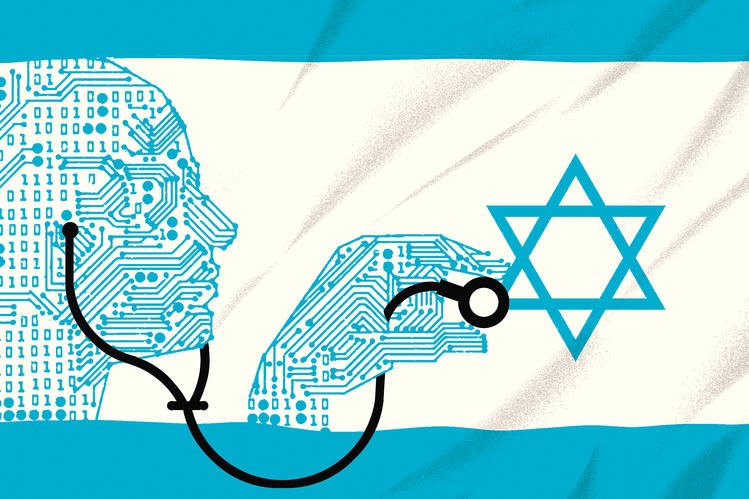
Tourists, Students, and Foreign Workers
If you are a tourist, student, or foreigner living in Israel, you must gain access to medical services, should the need arise. All non-Israeli citizens seeking health insurance have a variety of options. You can choose a private policy from one of the four Health Maintenance Organizations (Clalit, Maccabi, Leumit, Meuhedet). The Harel Insurance and Finance Company provides another type of foreign insurance to tourists, students, and foreign workers.
Some important points that need to be considered as tourists or foreigners are as follows:
- Tourists with travel health insurance policies from their home country will pay out of their pocket for medical services and submit a receipt for reimbursement to their health care provider.
- Students are usually provided with comprehensive health care policies through the university and should contact the program’s head for further information.
- Foreigners should also be provided with a health insurance policy by an employer. Please contact your employer with questions about your individualized policy.
- Four medical insurance policies cover standard medical services from one of the four healthcare service providers in Israel.
Healthcare insurance payments for newcomers are based on a progressive income-based rate. These payments are deducted from the individual’s monthly salary, pension, or other sources of income. There are also exemptions and discounts available for certain groups, such as low-income individuals.
Israel offers specific health care benefits for new immigrants, including a period during which they may receive discounted health care payments. The exact benefits and duration of the discount vary based on the individual’s circumstances.
Healthcare coverage is an essential aspect of the integration process for newcomers in Israel, ensuring that they have access to necessary medical care and services. Newcomers should explore different HMO options and understand the coverage and services offered by each before making a decision.

Dos and Don’ts
- Newcomer Dos and Don’ts
- Use of Emergency Service
- Professional Development
Newcomer Dos and Don’ts
For newcomers in Israel, there are several important things to consider and actions to take to ensure a smooth transition and successful integration into the country. As a newcomer, one of the first steps is to register with a health maintenance organization (HMO) of your choice. Ensure that you apply for a valid Israeli ID card and any necessary visas or residency permits. While English is widely spoken, learning basic Hebrew phrases can greatly enhance your ability to communicate and connect with locals.
There are also some important things you have to consider as a newcomer. When visiting religious sites, avoid touching sacred objects unless indicated it’s permissible. Avoid scheduling work-related activities or business meetings on Shabbat, as it’s considered disrespectful.

Dos: Here are some “dos” for newcomers in Israel:
Apply for an ID and Visa: Applying for an ID and visa is a crucial step in establishing legal residency and gaining access to various services. Upon arrival, individuals need to initiate the process of obtaining the necessary documentation. This typically involves applying for a residency visa, which aligns with the purpose of their stay, whether it’s for work, study, or other reasons. The application process often requires submitting relevant documents, such as a passport, proof of purpose (such as a job offer or acceptance letter from a university), and any additional required forms.
Once the visa is approved, newcomers can proceed to apply for an Israeli identification card, known as a Teudat Zehut. This card serves as a primary form of identification and is required for various transactions and interactions within the country. Both the visa and identification card are essential documents that provide newcomers with legal status and the ability to access services such as health care, employment, and opening a bank account.
Register with an HMO: Once newcomers arrive in the country, they need to choose an HMO from the available options, such as Clalit, Maccabi, Meuhedet, and Leumit. Registering with an HMO provides individuals and families with a health care card that grants access to a wide range of medical services, including doctor visits, hospital care, specialist consultations, and prescription medications.
Research Housing Options: Whether renting or purchasing a property, conducting thorough research is essential. Newcomers should explore different neighborhoods, and consider proximity to work or study institutions, transportation options, and local amenities. Online platforms, real estate agencies, and community groups can provide valuable insights into available properties.
Understand Financial Matters: Upon arrival, newcomers should familiarize themselves with the local currency (Israeli Shekel), banking procedures, and financial regulations. Opening a bank account is essential for managing finances, receiving salary payments, and conducting transactions. It’s advisable to compare different banks and their services to choose one that suits individual preferences.
Enroll in Ulpan: An Ulpan is a language school that offers intensive Hebrew courses tailored to various proficiency levels. These courses provide newcomers with the opportunity to learn and improve their Hebrew language skills, which is essential for effective communication and engagement with locals.
Participate in Integration Programs: These programs cover a wide range of topics, including language acquisition, cultural orientation, legal processes, employment opportunities, and social networking. Through workshops, seminars, and interactive activities, newcomers gain insights into Israeli society, norms, and practicalities. Integration programs also provide a platform for newcomers to connect with other individuals who are experiencing similar transitions, fostering a sense of community and mutual assistance.
Don’ts: Here are some “don’ts” to consider:
Don’t Disregard Shabbat: Shabbat is the Jewish day of rest, observed from Friday evening to Saturday evening. During this time, many businesses and public services, including transportation,
came to a halt. Newcomers need to be aware of and respect these traditions by refraining from engaging in loud activities, using public transportation, or conducting business transactions during Shabbat.
Don’t Overlook Dress Code: While Israel is relatively diverse and accepting of various clothing styles, it’s advisable not to overlook the dress code, especially in certain contexts. When visiting religious sites, more conservative areas, or participating in formal occasions, opting for modest attire is a sign of cultural sensitivity.
Don’t Disrespect Religious Spaces: Israel is a land of diverse faiths, and its religious sites hold deep significance for various communities. When visiting places of worship, such as synagogues, churches, mosques, or other sacred sites, it’s crucial to show reverence and adhere to any guidelines provided by the religious community.
Don’t Interrupt Religious Observances: When encountering religious observances, whether in public spaces or within religious establishments, it’s essential to maintain a respectful distance and avoid behaviors that could disrupt these practices.
Don’t Disregard Security Measures: Due to the unique geopolitical landscape, security measures are an integral part of daily life. Airports, public transportation hubs, and certain public venues often have security checks in place. Newcomers should follow the instructions of security personnel, cooperate with screening procedures, and remain patient during these processes.
Don’t Disrespect Dietary Laws: Israel is home to various religious groups, each adhering to specific dietary restrictions. When invited to someone’s home or dining in restaurants, it’s important to be mindful of these dietary laws, particularly kosher dietary practices. This involves refraining from consuming certain types of food, such as pork or shellfish, and ensuring that meat and dairy products are not mixed in the same meal.
Don’t Avoid Asking Questions: Israel’s rich cultural landscape presents numerous opportunities to learn and engage. Locals often appreciate newcomers showing an interest in their culture, history, traditions, and way of life. Asking questions about local customs, language, and landmarks, and even navigating daily routines demonstrates a genuine eagerness to understand and adapt to the new environment.
Use of Emergency Service
For newcomers in Israel, understanding how to use emergency services is vital to ensure personal safety and well-being. In case of emergencies, newcomers can dial specific emergency hotline numbers to access the appropriate assistance:
Medical Emergencies: If facing a medical crisis or injury, newcomers should dial 101, the emergency medical services hotline. Magen David Adom (MDA) will dispatch an ambulance and paramedics to provide immediate medical aid and transportation to a hospital if needed.
Police Assistance: If witnessing or experiencing a crime, newcomers can dial 100 to reach the police. The police will respond to criminal incidents, accidents, or situations requiring law enforcement intervention.
Fire and Rescue: In case of fires, hazardous materials incidents, or rescues, newcomers can dial 102 to contact the fire and rescue services. Trained professionals will respond promptly to address the situation.
General Emergencies: If unsure about which service to call, newcomers can dial 112, a general emergency number that redirects to the appropriate service based on the situation.

Professional Development
Professional development in Israel is a dynamic and multifaceted journey that offers individuals opportunities to enhance their skills, broaden their knowledge, and advance their careers. The country’s vibrant economy, innovative industries, and strong academic institutions create an environment conducive to growth. Israelis place high value on education and skills acquisition, resulting in a robust array of programs, workshops, and training initiatives.
From attending conferences and workshops to pursuing higher education degrees, professionals in Israel have access to various avenues for continuous learning and career advancement. Additionally, Israel’s thriving tech sector, startup ecosystem, and research institutions attract talents seeking to contribute to cutting-edge advancements in fields like technology, healthcare, and renewable energy.

Benefits of Professional Development: Engaging in professional development in Israel offers a multitude of benefits for individuals seeking to excel in their careers and personal growth. One key advantage is access to a thriving ecosystem of innovation and expertise, particularly in sectors like technology, research, and entrepreneurship.
Moreover, Israel’s emphasis on education and research nurtures a culture of curiosity and excellence, motivating professionals to stay at the forefront of their fields. The benefits of professional development in Israel extend beyond individual growth, positively impacting organizations and contributing to the country’s overall economic and technological progress.
Here are some important benefits you get from professional development:
Enhanced Skills and Knowledge: Through a diverse array of training programs, workshops, and seminars, individuals gain access to cutting-edge insights and expertise. Whether in technology, healthcare, or entrepreneurship, these opportunities provide a platform for honing technical skills, refining leadership abilities, and mastering industry-specific tools. By fostering a culture of continuous learning, Israel’s professional development initiatives empower individuals to stay ahead of evolving trends and technologies.
Increased Productivity: Through tailored training programs and workshops, employees gain a deep understanding of best practices, advanced methodologies, and innovative approaches. As these newfound insights are applied to real-world scenarios, work processes become more streamlined and efficient. Furthermore, the continuous learning culture fostered by professional development encourages individuals to constantly seek ways to optimize their performance. This heightened productivity not only benefits organizations by delivering enhanced outcomes but also contributes to the overall growth and competitiveness of Israel’s economy on a global scale.
Competitive Advantage: The emphasis on continuous learning and skill enhancement allows individuals to stay ahead of industry trends and emerging technologies. This, in turn, equips organizations with a talent pool capable of driving innovation, improving processes, and delivering high-quality products and services. The accumulation of advanced skills and knowledge also positions Israeli companies as leaders in their respective fields, attracting attention on the global stage.
Employee Retention: By offering opportunities for continuous learning and skill enhancement, organizations demonstrate their commitment to the growth and advancement of their employees. This investment in professional development not only enhances job satisfaction but also creates a sense of belonging and engagement among the workforce. Employees who feel supported in their career development are more likely to remain with their current employers, reducing turnover rates and the associated costs of recruitment and training.
Innovation and Creativity: By exposing individuals to new ideas, methodologies, and interdisciplinary approaches, these programs encourage participants to think outside the box and explore novel solutions to complex challenges. The emphasis on continuous learning and skill diversification helps break down traditional boundaries, enabling professionals to combine insights from different domains to create innovative products, services, and processes. This culture of ongoing development encourages risk-taking, experimentation, and collaboration, which are essential ingredients for driving forward-thinking advancements.
Ways to pursue Professional Development: Pursuing professional development in Israel involves a diverse array of avenues designed to cater to individual needs and career aspirations. One of the primary methods is through enrolling in workshops, seminars, and courses offered by universities, vocational schools, and specialized training centers across the country. These programs cover a wide range of topics, from technology and business to arts and sciences, ensuring participants have access to the latest industry insights.
Additionally, online learning platforms offer flexible options for individuals to enhance their skills remotely. Conferences, industry events, and networking sessions provide opportunities to connect with experts and peers, fostering knowledge exchange and potential collaborations. Professional associations and organizations often organize events and workshops tailored to specific industries.
Here are some important ways through which you can pursue professional development:
Self-Study and Reading: Self-study and reading are integral components of pursuing professional development in Israel. By taking the initiative and delving into relevant books, research papers, online articles, and industry publications, individuals can proactively expand their knowledge and stay up-to-date with the latest trends and advancements.
This approach empowers learners to tailor their learning experience, focusing on areas that align with their career goals and interests. Moreover, the flexibility of self-study allows professionals to learn at their own pace and integrate learning seamlessly into their daily routines.
Volunteering and Community Involvement: By dedicating time and expertise to meaningful causes, individuals not only contribute to their communities but also enhance their skills and expand their networks. Volunteering can develop leadership, communication, and project management skills, which are valuable assets in various professional settings. Additionally, community involvement exposes individuals to diverse perspectives and challenges, fostering adaptability and problem-solving abilities. Collaborating with people from different backgrounds fosters cultural competence and enriches personal growth.
Entrepreneurship Hubs: In these dynamic environments, aspiring entrepreneurs and professionals can immerse themselves in a culture of innovation, creativity, and collaboration. These hubs often offer a plethora of resources, including workshops, incubation programs, mentorship opportunities, and networking events. By participating in hackathons, accelerator programs, and workshops, individuals can refine their entrepreneurial skills, business acumen, and strategic thinking. The close-knit startup ecosystem fosters connections with seasoned entrepreneurs, investors, and industry experts, opening doors to potential partnerships and investments.
Mentorship and Coaching: Through one-on-one guidance and personalized advice, individuals can tap into the expertise of seasoned professionals and industry veterans. Mentors and coaches offer insights that are often unavailable in traditional educational settings, helping mentees navigate challenges, set achievable goals, and make informed decisions. This personalized approach accelerates skill development, fosters self-awareness, and cultivates a broader perspective on one’s career trajectory.
Ultimately, the pursuit of professional development in Israel is highly versatile, allowing individuals to choose paths that align with their career goals, learning preferences, and schedules.
